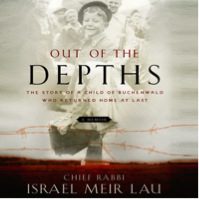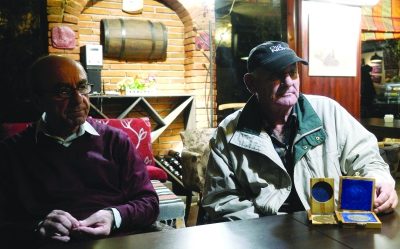 Have you had a chance to pick up any of the books from our holiday reading list, published here on Rocky Mountain Jew? One of the aspects we most enjoyed about Rabbi Israel Meir Lau’s biography was the myriad anecdotes, many of which involve the Holocaust in some way — not surprising considering that Lau himself is a survivor. And his role as chief rabbi brought him into contact with a vast range of people, from the known to the unknown.
Have you had a chance to pick up any of the books from our holiday reading list, published here on Rocky Mountain Jew? One of the aspects we most enjoyed about Rabbi Israel Meir Lau’s biography was the myriad anecdotes, many of which involve the Holocaust in some way — not surprising considering that Lau himself is a survivor. And his role as chief rabbi brought him into contact with a vast range of people, from the known to the unknown.
It was at one of these meetings where Lau heard a different interpretation of the story of Noah after the flood, found in this week’s Torah portion. To briefly recap the Biblical incident: Following the flood, which wiped out everything apart from whatever was in the ark, Noah becomes a vintner, and “He drank of the wine and became drunk, and he uncovered himself within his tent” (Gen. 9:21). This drunken and inappropriate behavior of Noah’s is often criticized, but in Out of the Depths, Lau shares a powerful interpretation as told to him by Yiddish poet Itzik Manger.
Manger, a Holocaust refugee who suffered from alcoholism, calls himself “Noah after the flood.” Lau recounts visiting an ill and emaciated Manger in the hospital, who tried to reconcile the Torah’s description first of Noah as a tzadik and then later as a drunk.
“How can a tzadik also be a drunk? I always wondered about this, but now I have reached an age and a condition where I understand Noah,” says Manger.
When he went back home [after the flood] and began to look for his hometown, his shtetl — he found nothing. He wanted to visit his neighborhood shtiebel, his study hall, his synagogue, but found no trace…Where was the postman he knew, the wagon driver? No one was left. No house or street, no neighorhood or friends — not a living soul…In order to forget his solitude, he drank of the wine and became drunk (Gen. 9:21).”
It’s a vastly new interpretation of the incident, and one that directly speaks to Noah’s circumstances. Manger begins naming communities and yeshivas in Warsaw, rabbis and family members from there — all gone. Like in Noah’s times, All existence on earth was blotted out (Gen. 7:23). Or so it felt to Manger, who lost his entire family in the Holocaust.
“No one is left,” he says to Lau. “I remained alone in the world. So you will excuse me…if sometimes, in order to forget the horrors, I drink a little.”
Of course the metaphor isn’t perfect — Noah knew what was coming and his family was saved — but there’s a brutal honesty in the story and in the emotions. Manger’s interpretation proves the adage: Don’t judge a man until you’ve walked a mile in his shoes.
For some, surviving can be a catalyst of ambition (as Lau says of himself), for other, surviving survival proves too difficult. That’s Noah after the flood.













I don’t usually comment, but this shook me up. My grandparents were both the only Holocaust survivors from their families. They lived but their whole world disappeared. I never thought about Noah’s story this way. He knew it was coming, but did that make it better/easier for him?